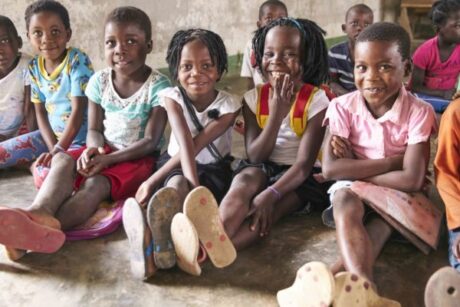A Mozambican student sits under the shade of a towering Baobab tree with a textbook in hand, enthusiastically opens the cover and thumbs through each chapter to explore the captivating illustrations on display.
Despite the desire to understand the printed words, the curious learner can’t fully comprehend the letters and numbers on the page because he does not speak or read Portuguese. He speaks Echuwabo—one of 43 langues locales in Mozambique.
Portuguese is the country’s official national language and the basis for teaching core subjects in school.
“Mother language instruction is an essential component to inclusion in education,» dit Corrie Blankenbeckler, Associé principal pour Systèmes pédagogiques and Governance at Creative Associates International.
Schools in the country lack learning and teaching resources, including local language materials.
Lisons! (Lisons! en portugais) is working with the Mozambique government to improve the reading and writing skills of children in first, second and third grades by developing bilingual literacy materials in the local languages of Emakhuwa, Elomwe and Echuwabo in the provinces of Nampula and Zambézia, where a baseline assessment revealed more than 90 pour cent des élèves de deuxième année could not read two words in Portuguese.
Le programme est financé par le NOUS. Agence pour le développement international, et mis en œuvre par Creative Associates International, en partenariat étroit avec Éducation mondiale, Inc.., Conseil stratégique à l’étranger, Instituts américains de recherche et groupeArbrebleu.
Le quinquennat, evidence-based program is building the Ministry of Education and Human Development’s institutional ability for bilingual early grade literacy instruction, as it expands the country’s early grade bilingual education program.
Selon un 2016 United Nations report on education, as much as 40 pour cent of the global population does not have access to an education in a language they speak or understand, causing a high number of school dropouts and low completion rates at primary schools and pushing marginalized communities further into poverty.
These barriers hinder ethnically diverse students from possessing essential literacy and writing skills, needed to succeed in school and life.
“Illiterate youth then grow to be illiterate young adults, who are excluded from society with limited employment opportunities," dit Blankenbeckler, who provides technical assistance for the Lisons! programme.
Literacy rates in Mozambique are higher than the average for the Sub-Saharan region, with an average rate of illiteracy among adults at about 53.6 pour cent, according to the Mozambique National Institute of Statistics.
“Education should ensure that all learners, regardless of the language they speak with their parents, have the same learning opportunities in order to reach their full potential," dit Blankenbeckler.
Mother tongue-based bilingual (or multilingual) education approaches can improve performance in the second language as well as in other subjects, selon UNESCO.
Pierre Potier, Lisons! Chef de parti, explains the program’s strategic focus of partnership, “As Lisons! works toward the goal of helping learners gain proficiency in reading and writing in local languages they already speak and understand, a close collaboration with the Mozambican government is essential to reaching the programs goals and long-term sustainability.”
To Potter, the close partnership with key stakeholders is succeeding.
“With only a year into the project, we’re already witnessing increasing interest, active participation and ownership for the program by the government,” says Potter. “This creates a strong foundation for the expansion of bilingual literacy and the transformation of bilingual education in Mozambique.”
Establishing ownership to create a path to success
Education and language experts recently gathered at the launch of the first Lisons! materials development workshop in Maputo, Mozambique, to collaborate and learn about the development of specific strategies for elaborating reading and teaching materials for the early grades.
During the four-day workshop in March, Armindo nngun, Doctorat, Vice-ministre du ministère de l'Éducation et du Développement humain, explained the government’s desire that children learn how to read and write, as quickly and effectively as possible through quality learning and teaching.
“Fluent reading and writing is one of the main challenges for education in Mozambique," dit Horloge.
Ministry representatives participated in the materials development workshops, including Gina Guibunda, Doctorat, Director of National Primary Education, along with other high level technical and administrative representatives from the National Institute of Education Development, Adult Education, Teacher Training and the Provincial Directorates of Education and Human Development.
Ngunga reiterated the need for coordination between the different directorates in attendance and that all would be responsible for the joint effort to improve the quality of the early grade reading in the country.
He emphasized the need for ownership by the government and strong partnerships among stakeholders so that they can jointly achieve their goal of boosting literacy in the languages children hear, speak and read at home as an effective way to also achieve literacy in Portuguese later on.
“We want children to be able to master reading simple words and sentences in their own languages,” shared Ngunga. “If we can provide the lessons in the local languages of the children and teachers, information flows automatically and success is guaranteed.”



